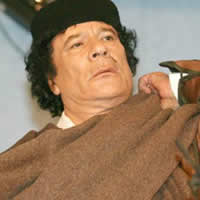UK armed Gaddafi, now arming rebels

to Gaddafi while the UK is considering arming more Libyans – rebels this time.
The rebels say they lack the ammunition needed to fight off the forces of Colonel Gaddafi.
In the meantime, it is believed Gaddafi was planning to use force to crackdown on protesters long before the uprising began, and the UK was its main arms provider.
That explains why the Libyan security forces have been putting down unrest in the country with plenty of rubber bullets, tear gas and other ammunition to a considerable degree British made.
The UK was still selling arms to Libya just four months before the Libyan crisis flared, with government ministers approving a deal for sniper rifles, bullets and tear gas.
“There is a very strict set of guidelines that say where it is likely that human rights violations might take place, you are not supposed to sell the weapons. I would say, looking back through a number of credible sources, including Amnesty International, that it was always very likely that equipment supplied to Colonel Gaddafi would and could be used in the brutal crackdown on protesters,” says Oliver Sprague from the non-governmental organisation, Amnesty International.
Arms exports is big business in the UK, valued at nearly US$12 billion in 2009. Now, a highly critical report by MPs exposes the scale of UK arms sales to some of the world’s most brutal regimes.
The Libyan export licences were some of the most valuable – according to the report, the UK sold nearly US$350 million worth of arms there in the year leading up to September 2010.
In the same year Egypt bought US$27 million worth of small guns and electronic warfare equipment from the UK, and Bahrain ordered more than US$10 million of guns and crowd control agents.
Dozens of arms export licences to the region have now been hastily revoked. But still, days into the unrest in Cairo, UK Prime Minister David Cameron led a junket to the Middle East to flaunt the wares of British arms dealers.
“I can’t imagine who that was in the Prime Minister’s office, who said to them: look you have been arming these dictators to the teeth for the decades. They have spent a certain amount of the weaponry you gave them shooting their own population. Now is a really good time to go and try to sell them some more,”mocks John Rees from Stop The War Coaliton.
“I can’t imagine what damage it has done when people see British made weaponry in the hands of the people who are invading Bahrain and putting down its protesters at the moment,” John Rees says.
The report’s authors say the government “misjudged the risk” of selling arms to countries like Egypt and Bahrain – but many would go much further.
“One of the things that you’ve seen as a characteristic of British aid around the world over the last 10 years has been the provision of this highly militarised security sector . . . so it’s exactly the opposite of trying to stimulate democracy – we are providing the means by which those countries’ regimes can clamp down on democracy,” says John Hilary, executive director of War on Want.
Since the violence began, more than a thousand people have been killed in Libya, as well 26 killed and a thousand injured in Bahrain. Circumstantial evidence gathered by the report’s authors suggests much of that damage was done with British weapons.
When the unrest started in the Middle East, the government scrambled to suspend arms export licenses. But this report is evidence that it closed the stable door long after the horse had bolted, when British weapons were probably already being used against civilians in Bahrain and Libya. The government still hasn’t ruled out arming the rebels in Libya – it remains to be seen whether these damning revelations will make them think twice.
The British foreign secretary has said that the UN resolution on Libya made it legal “to give people aid in order to defend themselves”. – Russia TV.









Comments